选择性必修三 Unit 3 Environmental Protection - Using language 1(25张PPT)
文档属性
| 名称 | 选择性必修三 Unit 3 Environmental Protection - Using language 1(25张PPT) |
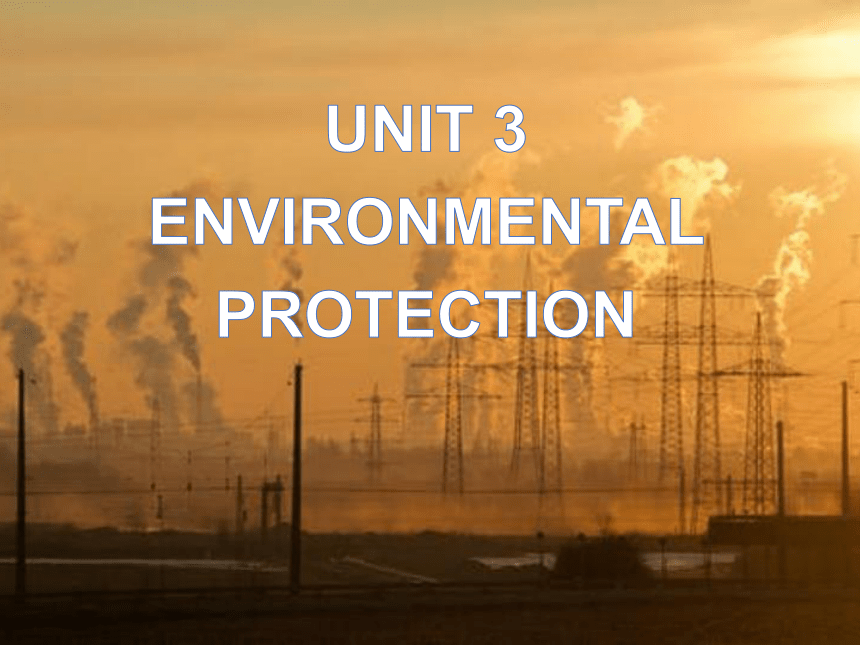
|
|
| 格式 | pptx | ||
| 文件大小 | 2.7MB | ||
| 资源类型 | 试卷 | ||
| 版本资源 | 人教版(2019) | ||
| 科目 | 英语 | ||
| 更新时间 | 2022-02-05 17:45:14 | ||
图片预览

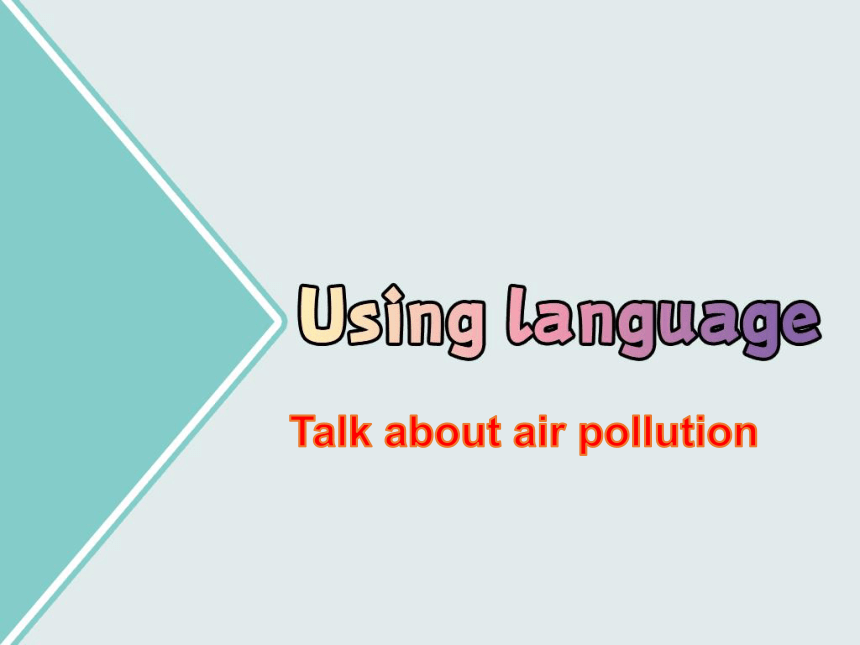
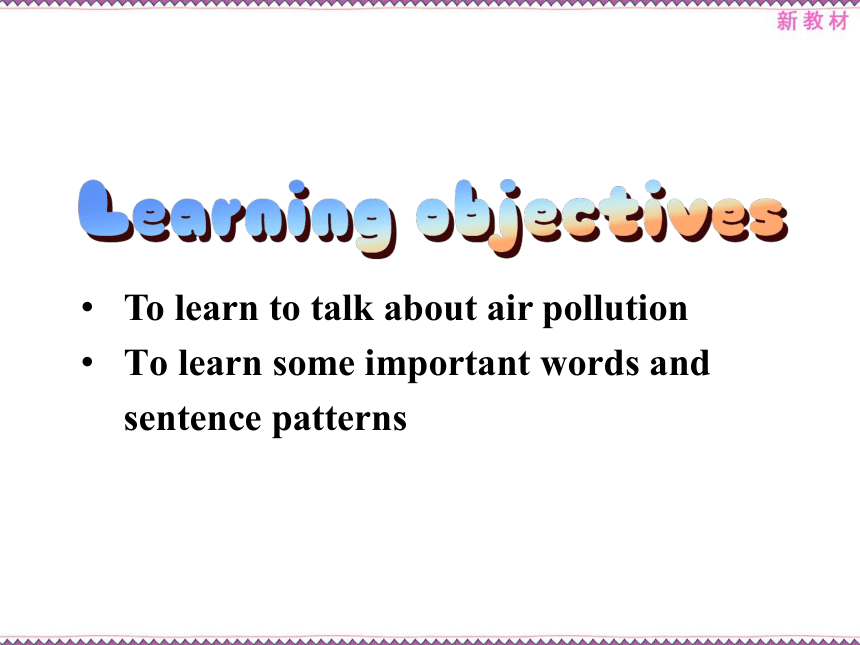
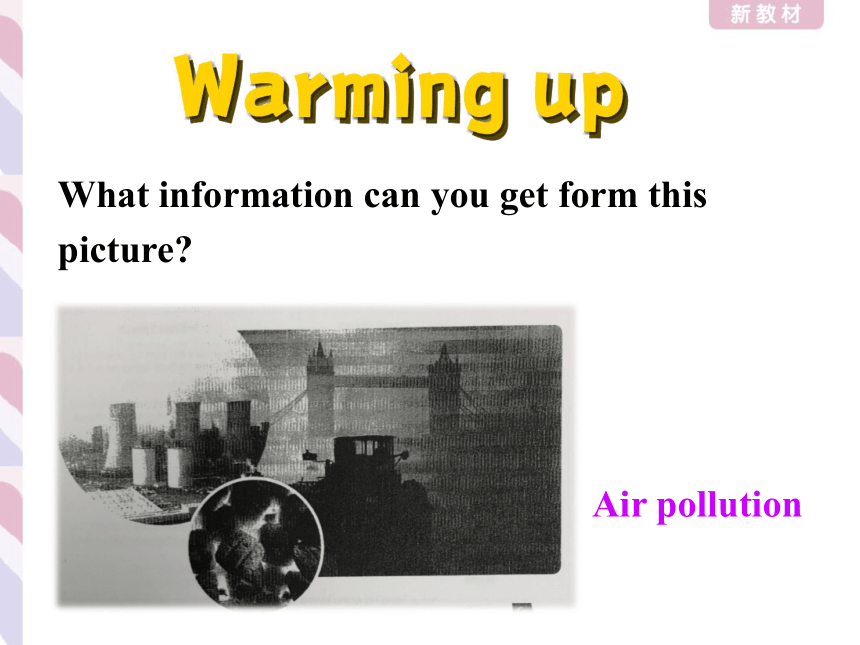
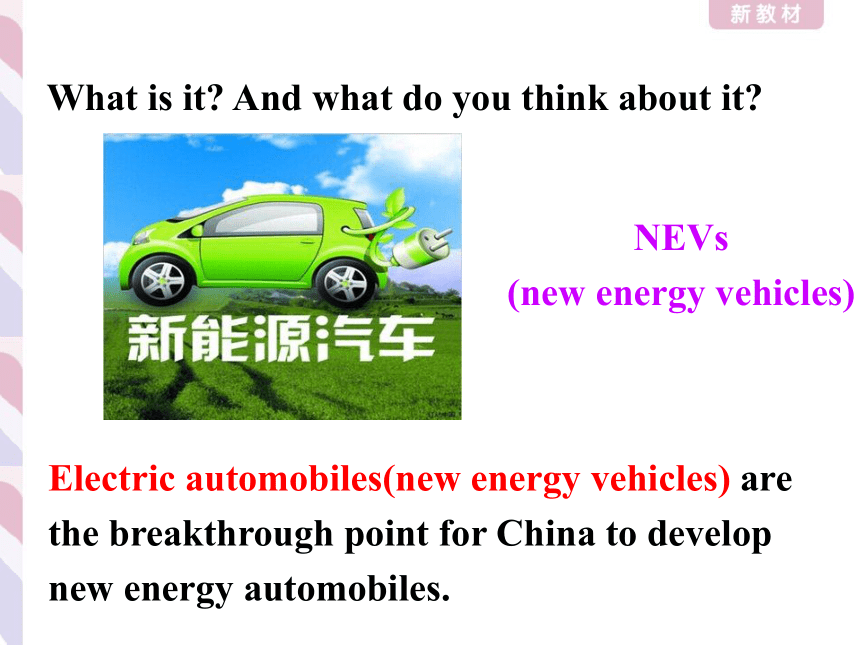
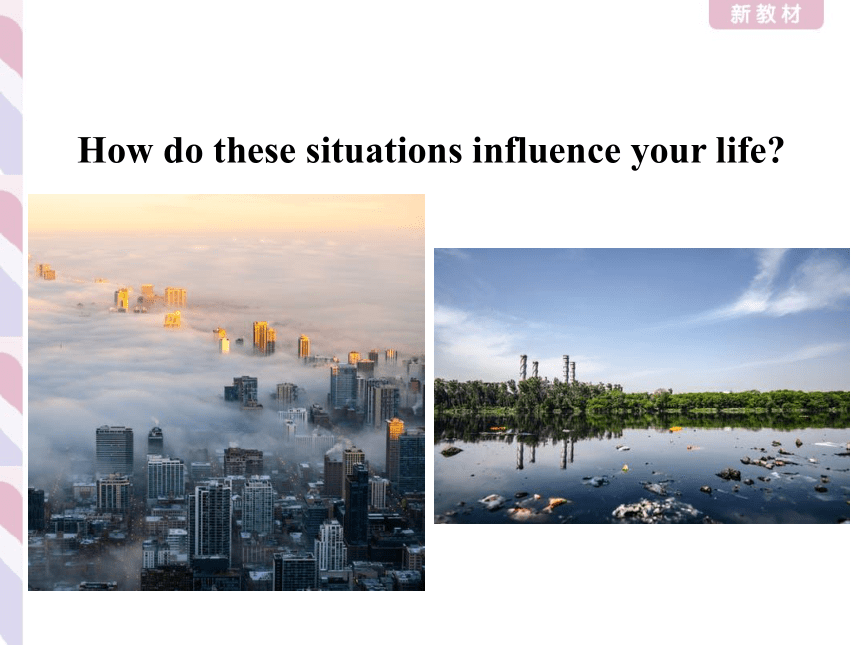
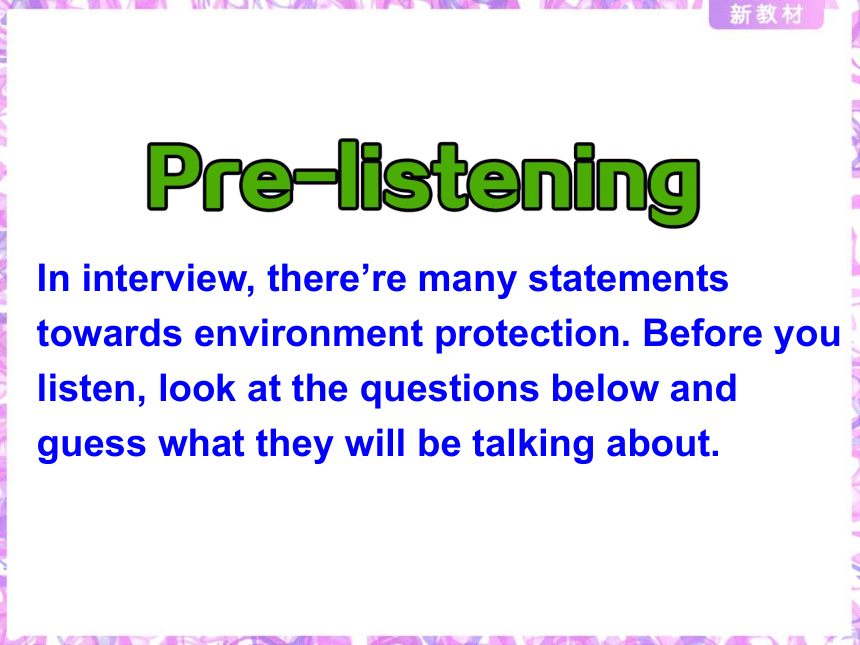
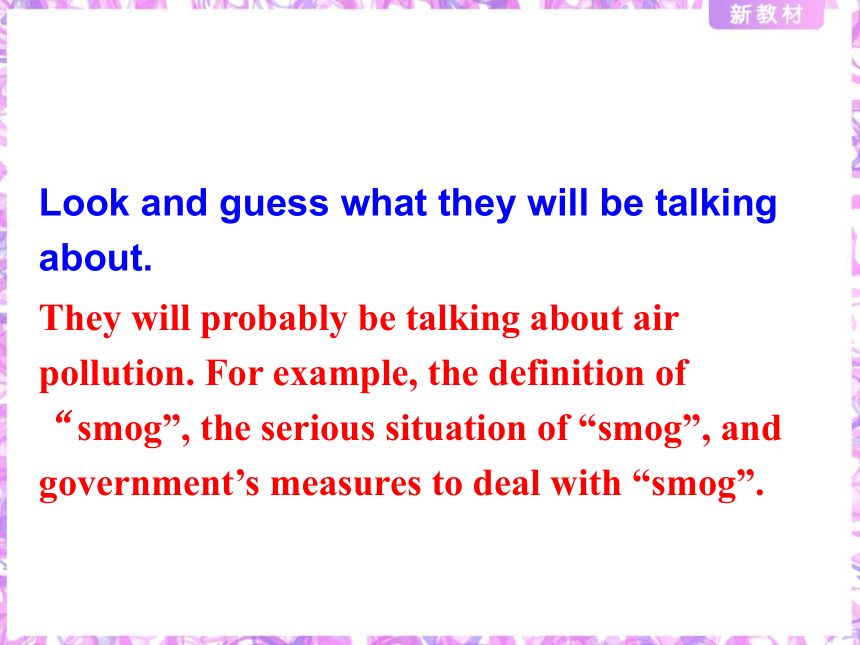
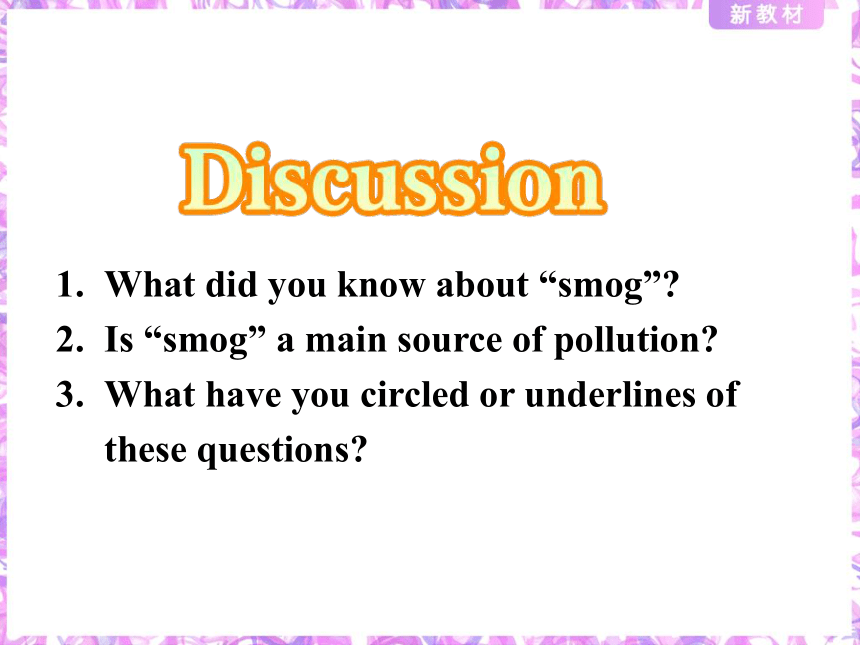
文档简介
(共25张PPT)
UNIT 3
ENVIRONMENTAL PROTECTION
Talk about air pollution
To learn to talk about air pollution
To learn some important words and sentence patterns
What information can you get form this picture
Air pollution
What is it And what do you think about it
Electric automobiles(new energy vehicles) are the breakthrough point for China to develop new energy automobiles.
NEVs
(new energy vehicles)
How do these situations influence your life
In interview, there’re many statements towards environment protection. Before you listen, look at the questions below and guess what they will be talking about.
They will probably be talking about air pollution. For example, the definition of “smog”, the serious situation of “smog”, and government’s measures to deal with “smog”.
Look and guess what they will be talking about.
What did you know about “smog”
Is “smog” a main source of pollution
What have you circled or underlines of these questions
1. The expression “smog” originated in Britain
and means a combination of “smoke” and
“fog”.
2. Smog became a severe problem in Britain
because people at that time burnt lots of
fossil fuels.
3. The worst smog in British history
happened in London in 1942.
4. The Great Smog of London claimed 5,000
lives.
5. Later, the UK government ordered people
not to burn wood in their homes.
Listen carefully again and answer the questions.
1. Is it the “smog” a compound word And why
Yes. And it is the combination of “smoke” and “fog”.
2. What did the government do towards “smog”
Summarize information
In active listening, summarizing helps you review the key points of a speaker’s message. In order to write a good summary, you must toke notes of the most important points as you listen. When summarizing, you need to be as concise as possible and use your own words.
Listen to an interview with an air pollution expert and decide whether the statements are true (T) or false (F).
1. The expression “smog” originated in Britain
and means a combination of “smoke” and
“fog”. ( )
2. Smog became a severe problem in Britain
because people at that time burnt lots of
fossil fuels. ( )
3. The worst smog in British history happened
in London in 1942. ( )
4. The Great Smog of London claimed 5000
lives. ( )
5. Later, the UK government ordered people
not to burn wood in their homes. ( )
Listen again and take notes on what the expert said. Then summarise the information you got from the interview.
Ben Drake, an expert on air pollution, is being interviewed on the radio. He said that smog was a severe problem ____________________ century in Britain. At that time, Britain was experiencing a boom in ___________________.
Factories and homes_____________________, which created smog. He also mentioned the heavy smog in London ______________in 1952.
Later the UK government restricted _________
________________ in homes and forced factories to _______________. As smog is harmful to everyone, the expert advised us to ______________, use ___________, and further develop _____________.
In groups of three, continue the conversation about environment pollution or the information you heard or read in this unit. End the conversation naturally.
Anna: I thought air pollution would be more
serious because of the advance of
economy.
Daiyu: Well, contrary to what many people
believe, there are many measures to
deal with the air pollution, actually.
Anna: ...
adj.相反的;相对立的
n.相反的事实 (或事情)
Discuss the questions. The expressions in the box may help you.
1. Have you experienced heavy smog where
you live Have you seen photos of big
cities under clouds of smog What is it
like
2. What do you think are the major causes of
smog in China
3. What measures have the government and
citizens taken to help address the problem
Referring to common knowledge
Everyone knows that …
Most people think that ...
As is known to all, ...
There is no doubt that ...
We all know that…
It is obvious that …
The conversation should include:
1. Some words about environment pollution
2. sentences to express future expectations
3. natural ending
Make up a dialogue about environment pollution with your partner. using the common knowledge expressions.
UNIT 3
ENVIRONMENTAL PROTECTION
Talk about air pollution
To learn to talk about air pollution
To learn some important words and sentence patterns
What information can you get form this picture
Air pollution
What is it And what do you think about it
Electric automobiles(new energy vehicles) are the breakthrough point for China to develop new energy automobiles.
NEVs
(new energy vehicles)
How do these situations influence your life
In interview, there’re many statements towards environment protection. Before you listen, look at the questions below and guess what they will be talking about.
They will probably be talking about air pollution. For example, the definition of “smog”, the serious situation of “smog”, and government’s measures to deal with “smog”.
Look and guess what they will be talking about.
What did you know about “smog”
Is “smog” a main source of pollution
What have you circled or underlines of these questions
1. The expression “smog” originated in Britain
and means a combination of “smoke” and
“fog”.
2. Smog became a severe problem in Britain
because people at that time burnt lots of
fossil fuels.
3. The worst smog in British history
happened in London in 1942.
4. The Great Smog of London claimed 5,000
lives.
5. Later, the UK government ordered people
not to burn wood in their homes.
Listen carefully again and answer the questions.
1. Is it the “smog” a compound word And why
Yes. And it is the combination of “smoke” and “fog”.
2. What did the government do towards “smog”
Summarize information
In active listening, summarizing helps you review the key points of a speaker’s message. In order to write a good summary, you must toke notes of the most important points as you listen. When summarizing, you need to be as concise as possible and use your own words.
Listen to an interview with an air pollution expert and decide whether the statements are true (T) or false (F).
1. The expression “smog” originated in Britain
and means a combination of “smoke” and
“fog”. ( )
2. Smog became a severe problem in Britain
because people at that time burnt lots of
fossil fuels. ( )
3. The worst smog in British history happened
in London in 1942. ( )
4. The Great Smog of London claimed 5000
lives. ( )
5. Later, the UK government ordered people
not to burn wood in their homes. ( )
Listen again and take notes on what the expert said. Then summarise the information you got from the interview.
Ben Drake, an expert on air pollution, is being interviewed on the radio. He said that smog was a severe problem ____________________ century in Britain. At that time, Britain was experiencing a boom in ___________________.
Factories and homes_____________________, which created smog. He also mentioned the heavy smog in London ______________in 1952.
Later the UK government restricted _________
________________ in homes and forced factories to _______________. As smog is harmful to everyone, the expert advised us to ______________, use ___________, and further develop _____________.
In groups of three, continue the conversation about environment pollution or the information you heard or read in this unit. End the conversation naturally.
Anna: I thought air pollution would be more
serious because of the advance of
economy.
Daiyu: Well, contrary to what many people
believe, there are many measures to
deal with the air pollution, actually.
Anna: ...
adj.相反的;相对立的
n.相反的事实 (或事情)
Discuss the questions. The expressions in the box may help you.
1. Have you experienced heavy smog where
you live Have you seen photos of big
cities under clouds of smog What is it
like
2. What do you think are the major causes of
smog in China
3. What measures have the government and
citizens taken to help address the problem
Referring to common knowledge
Everyone knows that …
Most people think that ...
As is known to all, ...
There is no doubt that ...
We all know that…
It is obvious that …
The conversation should include:
1. Some words about environment pollution
2. sentences to express future expectations
3. natural ending
Make up a dialogue about environment pollution with your partner. using the common knowledge expressions.
